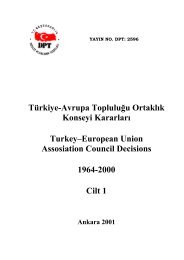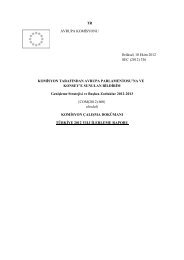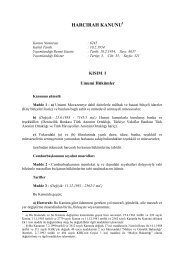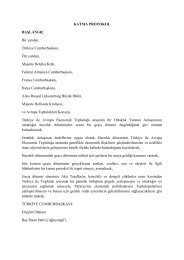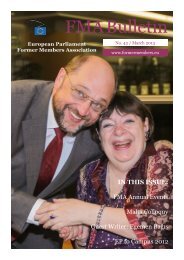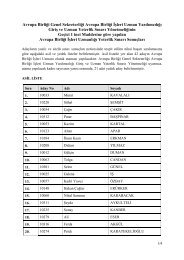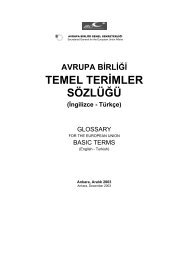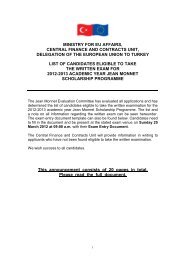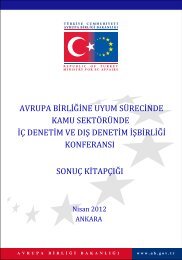2010 ilerleme raporu - Avrupa BirliÄi BakanlıÄı
2010 ilerleme raporu - Avrupa BirliÄi BakanlıÄı
2010 ilerleme raporu - Avrupa BirliÄi BakanlıÄı
Create successful ePaper yourself
Turn your PDF publications into a flip-book with our unique Google optimized e-Paper software.
firms. Overall, market exit procedures remain relatively cumbersome. The crisis had a<br />
negative impact on the number of newly established firms.<br />
Legal system<br />
Turkey has established most of the legal framework of a market economy, but must ensure<br />
further implementation. A reasonably well functioning legal system, including in the area of<br />
property rights, has been in place for several years. Registering a property requires six<br />
procedures and takes six days in Turkey. However, enforcing commercial contracts remains a<br />
lengthy process, which involves 35 procedures and takes 420 days on average. The<br />
specialisation of commercial court judges is insufficient, leading to lengthy court proceedings.<br />
The expert witness system still functions as a parallel judiciary system, without improving the<br />
overall quality. Use of out-of-court dispute-settlement mechanisms remains low. Overall, the<br />
legal environment, in particular court procedures, continues to pose practical challenges and<br />
create obstacles to a better business environment.<br />
Financial sector development<br />
The banking sector has shown resilience to the global financial crisis, largely due to major<br />
improvements made to the regulatory and supervisory framework in previous years. Risk<br />
ratios in the financial sector remained robust. The sector also benefited from the central<br />
bank’s liquidity measures and some easing of regulations governing loan classification and<br />
provisioning requirements. In a crisis context, a temporary easing of conditions for<br />
restructuring loans and a temporary elimination of general provisioning for new loans aimed<br />
at preserving the banks’ high capital adequacy ratios while encouraging lending. These<br />
measures helped the nominal capital adequacy ratio to increase to almost 20% by early <strong>2010</strong>,<br />
substantially higher than the EU legal requirement of 12%. Non-performing loans fell to<br />
about 5% by mid-<strong>2010</strong> from a peak of about 6% at the end of 2009 and stress tests by the<br />
regulator show that the sector is sound. The banking sector, by far the largest part of the<br />
financial sector, increased its share to 78% of the total financial sector. The relative size of the<br />
insurance sector increased slightly to 3%, about the same size as mutual funds. Domestic<br />
private banks had a 32.5% share of total assets, whereas the share of foreign banks increased<br />
to 39.5%, taking into account foreigners’ investments in the stock exchange, which is<br />
equivalent to 20% of banking sector assets. The Istanbul Stock Exchange increased<br />
considerably during 2009, with total stock market capitalisation almost doubling, from 19%<br />
of GDP in 2008 to 37% in 2009 and over 40% of GDP by mid-<strong>2010</strong>. Concentration in the<br />
banking sector remained broadly stable, as the shares of the top five and top ten banks were<br />
60% and 80%, respectively. However, due to the very strong ongoing credit growth fuelled by<br />
increased consumer and business confidence and low interest rates, regulatory authorities<br />
need to remain vigilant. Overall, in difficult crisis conditions, the financial sector has shown<br />
resilience thanks to earlier reforms.<br />
3.2. The capacity to cope with competitive pressure and market forces within the<br />
Union<br />
Existence of a functioning market economy<br />
The strength of domestic demand is fuelling a fast recovery from recession, which confirms<br />
the economy's improved shock resilience. But it is also fuelling rapid expansion in the current<br />
account deficit, pointing to the return of persistent imbalances in the Turkish economy. As the<br />
recovery gets under way, a golden opportunity for structural reforms is being opened up by<br />
EN 42 EN




